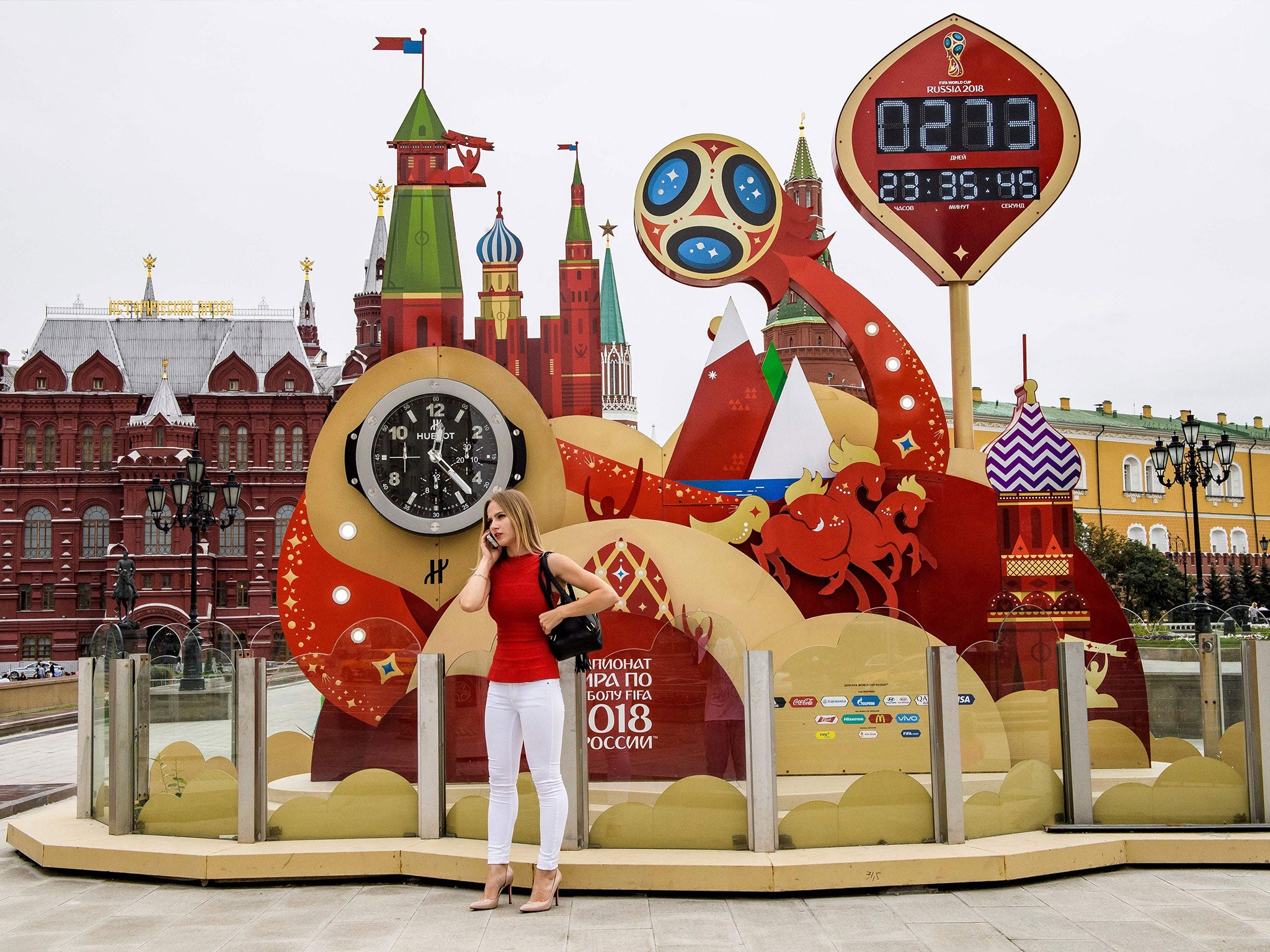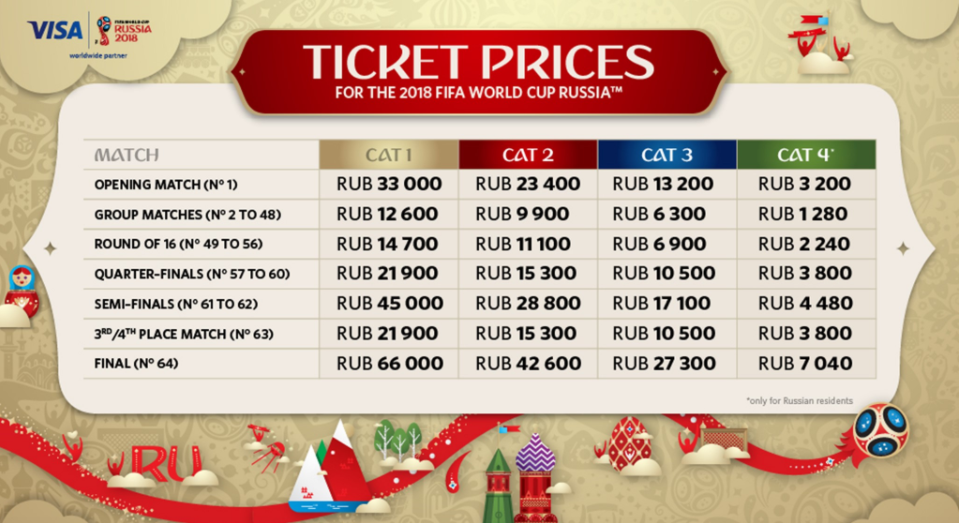The Independent's journalism is supported by our readers. When you purchase through links on our site, we may earn commission.
Russia World Cup travel guide: How can I get the best tickets? And what to do when I am there?
The world's greatest sporting event is the ideal time to visit the vast and fascinating host country

Your support helps us to tell the story
From reproductive rights to climate change to Big Tech, The Independent is on the ground when the story is developing. Whether it's investigating the financials of Elon Musk's pro-Trump PAC or producing our latest documentary, 'The A Word', which shines a light on the American women fighting for reproductive rights, we know how important it is to parse out the facts from the messaging.
At such a critical moment in US history, we need reporters on the ground. Your donation allows us to keep sending journalists to speak to both sides of the story.
The Independent is trusted by Americans across the entire political spectrum. And unlike many other quality news outlets, we choose not to lock Americans out of our reporting and analysis with paywalls. We believe quality journalism should be available to everyone, paid for by those who can afford it.
Your support makes all the difference.The 2018 World Cup in Russia presents a unique opportunity to visit the largest country on earth while it is in celebratory mood, hosting the biggest sporting event on the planet.
Fifa’s Secretary-General, Fatma Samoura, says: “Throughout history, fans have made a key contribution to the fascination of the Fifa World Cup. Russia promises to be a unique continuation of this history, with outstanding organisation and a great atmosphere in the stadiums.”
The matches will be played in some superb cities, and a special easing of the usual red tape means that football fans can watch games and sightsee without needing to apply for a Russian visa. But the country presents some challenges, from access to crime. This travel survival kit aims to help you make the most of the 2018 World Cup.
When and where?
The 21st World Cup takes place in Russia from 14 June to 15 July 2018. The first and last matches will be played at the Luzhniki Stadium in south-west Moscow, 1,550 miles from Wembley. The capital’s Spartak Stadium is also being used.
All the other venues are in western Russia, with only Yekaterinburg on the eastern side of the Urals; 2,430 miles from Wembley.
The closest to Britain is Kaliningrad, the city wedged in a Russian enclave between Poland and Lithuania. It is just 900 miles from Wembley. Next closest is St Petersburg, 1,290 miles from Wembley.
The remainder are further than Moscow but closer than Yekaterinburg: Kazan, Nizhny Novgorod, Rostov-on-Don, Samara, Saransk, Sochi and Volgograd.
Sign me up!
You’ll need to buy a “ticket-inclusive hospitality package” from the only company licensed to sell them: MATCH Hospitality. For 19 matches (including the opening game, both semis and finals) you can sign up for a package that provides top-grade suites at the Luzhniki and Spartak stadiums in Moscow, and the St Petersburg venue, you pay between US$1.5m (£1.14m) and US$2.8m (£2.12m). Flights and accommodation extra.
Cheaper deals are available, and you can sign up even if your team has not yet qualified. The “Team Specific Series” means you can pick one, two or three of the Group Matches of your chosen team — or, if you’re feeling lucky, all three plus the Round of 16 and Quarter Final involving your team. One match costs $850 (£650); all five a minimum of US$5,000 (£3,800). In the event your team does not qualify for the Quarter-Finals/Round of 16, you will get to see a different game.
That’s slightly more expensive than I had in mind …
Then apply as an individual for tickets. They went on sale at noon Moscow Time (10am BST) on 14 September.
Prices depend on the status of the match and the quality of the seats. The most expensive are Category 1 tickets for the final at 66,000 roubles (£825). Next, the semi-finals at 45,000 roubles (£563); the opening match, in which Russia will play, at 33,000 roubles (£413); the quarter-finals and 3rd/4th-place final 21,900 roubles (£286). For the Group matches, the standard price for Category 1 is 12,600 roubles (£157), and for the Round of 16 14,700 roubles (£184). Category 3 prices are half of these amounts.
There will also be “special-access tickets”: FIFA says it will ensure “a dedicated allocation of tickets for disabled people, people with limited mobility and fans classified as obese”. A separate class of tickets, Category 4, is available for local people for as little as 1,280 roubles (£16).

Applications for the first tranche of tickets can be made up to 12 October. “It will make no difference whether they submit their applications on day one, the last day or any time in between, as all applications will have the same chance of being successful,” says Fifa. If applications for a particular match exceed the available inventory, they will be randomly allocated.
Teams who failed to qualify outright will play each other between 6 and 14 November.
Successful and unsuccessful ticket applicants will be told their results by 16 November. That is also when any remaining tickets of the first tranche will be sold on a first-come, first-served basis.
But I don't know where England/Scotland/Northern Ireland/Wales will be playing …
The first tranche is mostly of interest to Russian citizens who want to see one or more games in their local venue, to fans who don’t mind which teams they see, or to wildly optimistic supporters who want to take a gamble on the date and venue.
Things get much more interesting after the draw to assign teams to groups and venues takes place on 1 December. Sales phase 2 starts on 5 December 2017 and continues to 31 January, with a further first-come, first-served spell from 13 March to 3 April if necessary.
Tickets bought during sales phases 1 and 2 will be delivered in April and May. There is a third phase, which looks like being a first-come, first-served last-minute scramble. Fifa says it will start on 18 April and run right through to the day of the Final, which will no doubt be of particular interest to England fans.
What next?
To avoid the considerable bureaucracy involved in getting a Russian visa, you must apply for a FAN ID — a personal spectator card. You can only do this when you have received the email confirming your tickets. The card enables you to apply for entry from 14 February onwards and stay until 15 August, so long as you can also produce a valid passport and either a match ticket or “a document providing the right to receive such a ticket” — an email confirmation should suffice.
How do I get there?
The easy cities to access are the capital and the former capital, Moscow and St Petersburg. Aeroflot serves Moscow from Gatwick and Heathrow, while British Airways serves both cities from Heathrow. In addition, there are dozens of connection opportunities from UK airports via European hubs. Fares are likely to be lower if you transit through the hub airport of a country that has not qualified for the last 32, because there will be less domestic demand to Russia during the World Cup.
The other nine cities are more difficult to access, though Austrian Airlines and LOT Polish Airlines serve many of them through their hubs at Vienna and Warsaw respectively.
Can I change money easily?
Yes. There is no point obtaining Russian roubles in advance. Even at airports, exchange rates are good, and in the cities competition is ferocious — with excellent deals for sterling.
How do I get around?
Rail or air are the best options. You can book main-line trains through Russian Railways' website. Airlines are generally high quality and reliable, especially Aeroflot and S7 Airlines — members of the Skyteam and Oneworld alliances respectively.
Can I drive?
You could drive to Russia (avoiding Belarus, which has visa issues), though be warned that a lot of preparation is required. Renting a car is feasible, with the big hire firms represented. But driving standards and road surfaces are poor; UN figures show that the death rate on Russian roads is six or seven times higher than in Britain.
“Be vigilant when driving, take account of weather conditions, and consider limiting or avoiding driving at night,” advises the Foreign Office.
Where will I stay?
That is likely to be the biggest problem facing fans at Russia 2018. While little is settled about the competition, the hotels in each host city know exactly when games will be played. They know that demand is going to be intense. A top-class hotel in Moscow over the Final weekend (13-16 July) is likely to cost £500 a night. Many hotels have already been blocked out for Fifa, though past experience suggests rooms will be released closer to the time.
When the teams playing at each venue are known, rates will soar higher. Prices are likely to be most competitive in Moscow, St Petersburg and Sochi, because they have the highest number of hotel rooms. If, say, Germany end up playing Russia in a quarter-final in Kazan, demands on accommodation will be immense.
No doubt “peer-to-peer” options and hostels will meet some of the demand. But a smart strategy could involve basing yourself somewhere out of town and travel in. For Moscow that might be the unglamorous town of Klin, 55 miles north-west; for St Petersburg, Shlisselburg, about 25 miles east of at the head of the Neva River on Lake Ladoga; and, for Kaliningrad, the most extreme option of staying in the fine Polish city of Gdansk.
What are the highlights between the matches?
Russia is rich in culture and natural beauty, with fascinating cities and countryside. But Moscow and St Petersburg are the undoubted highlights — vast metropoles with great art, architecture and indulgence in abundance. Sochi combines an impressive setting with an alluring seaside location and the infrastructure from the 2014 Winter Olympics.
As capital of the republic of Tatarstan, Kazan has an extra degree of intrigue. And students of the second Second World War may be attracted to Kaliningrad (formerly the Prussian city of Königsberg) and Volgograd (formerly Stalingrad),
Anything else I need to know?
Yes. The Organising Committee has some useful online guides, covering everything from taxis (where smoking and “riding with larger or exotic animals, for example, reptiles” should be discussed in advance) to the rules for bringing in prescription medicine.
The Foreign Office travel advice for Russia makes some specific warnings about crime: “Be alert to the possibility of mugging, pick pocketing and theft from vehicles or hotel rooms. The spiking of drinks does happen and can lead to robbery, violence and/or abuse. Buy your own drinks and keep sight of them at all times.
“In St Petersburg there have been reports of street crime where tourists have been specifically targeted. Be aware of pickpockets in the main tourist areas and around the main railway concourses. Bogus police officers have harassed and robbed tourists. If you are stopped always insist on seeing identification.
“Passports have been reported stolen or lost from British nationals when in the airports in Moscow. Be particularly vigilant when passing through the airports.
“Most visitors experience no difficulties but racially motivated attacks do occur. People of Asian or Afro-Caribbean descent may attract some unwanted attention in public places and should take care, particularly when travelling late at night.”
Join our commenting forum
Join thought-provoking conversations, follow other Independent readers and see their replies
Comments